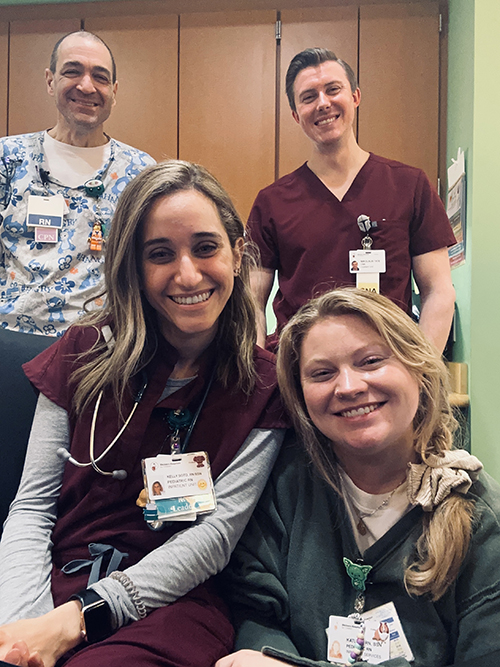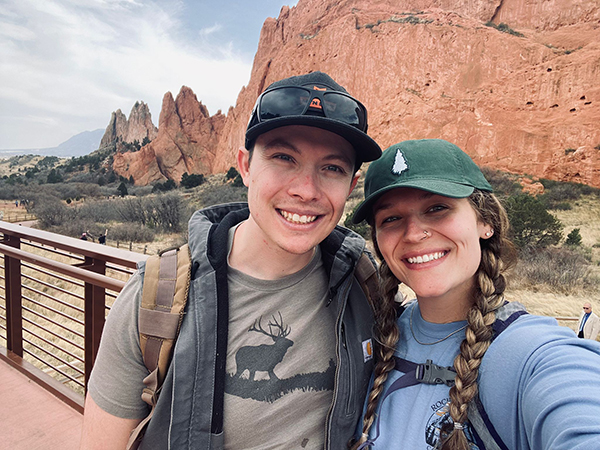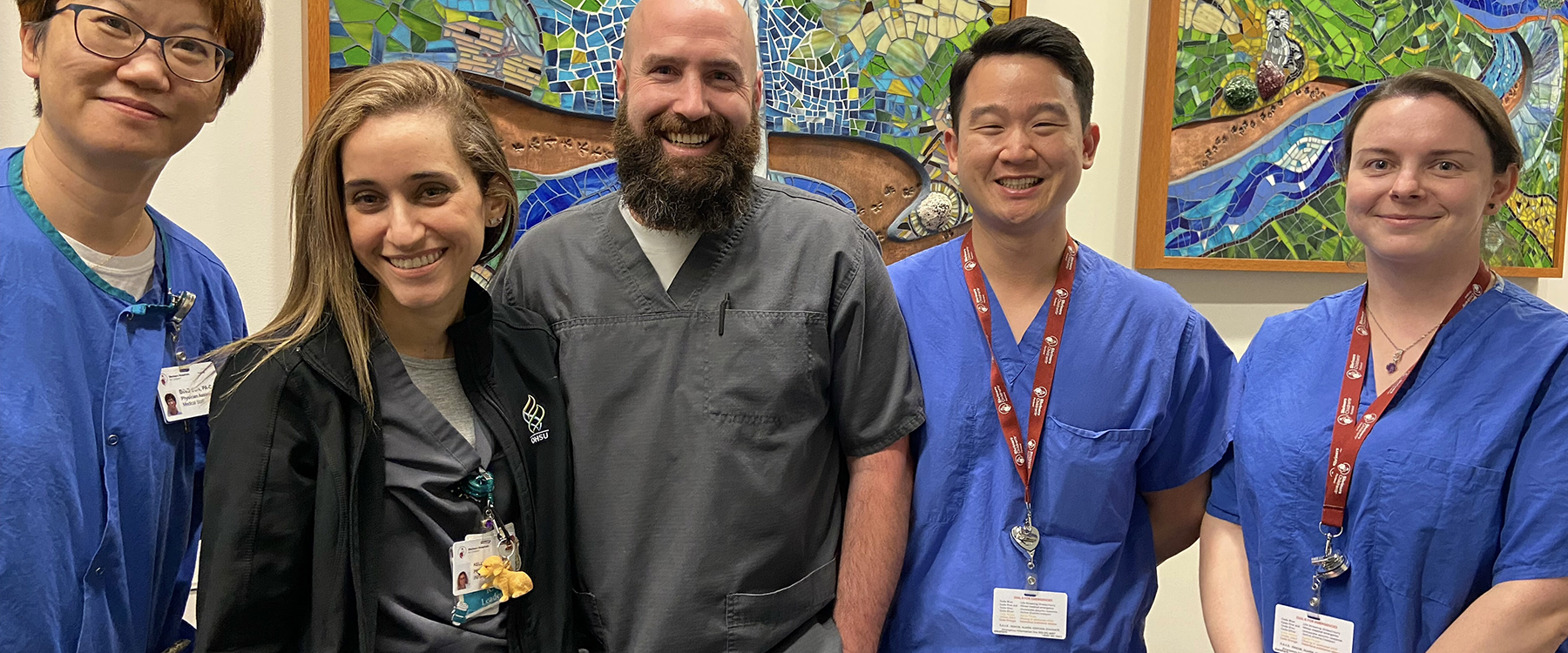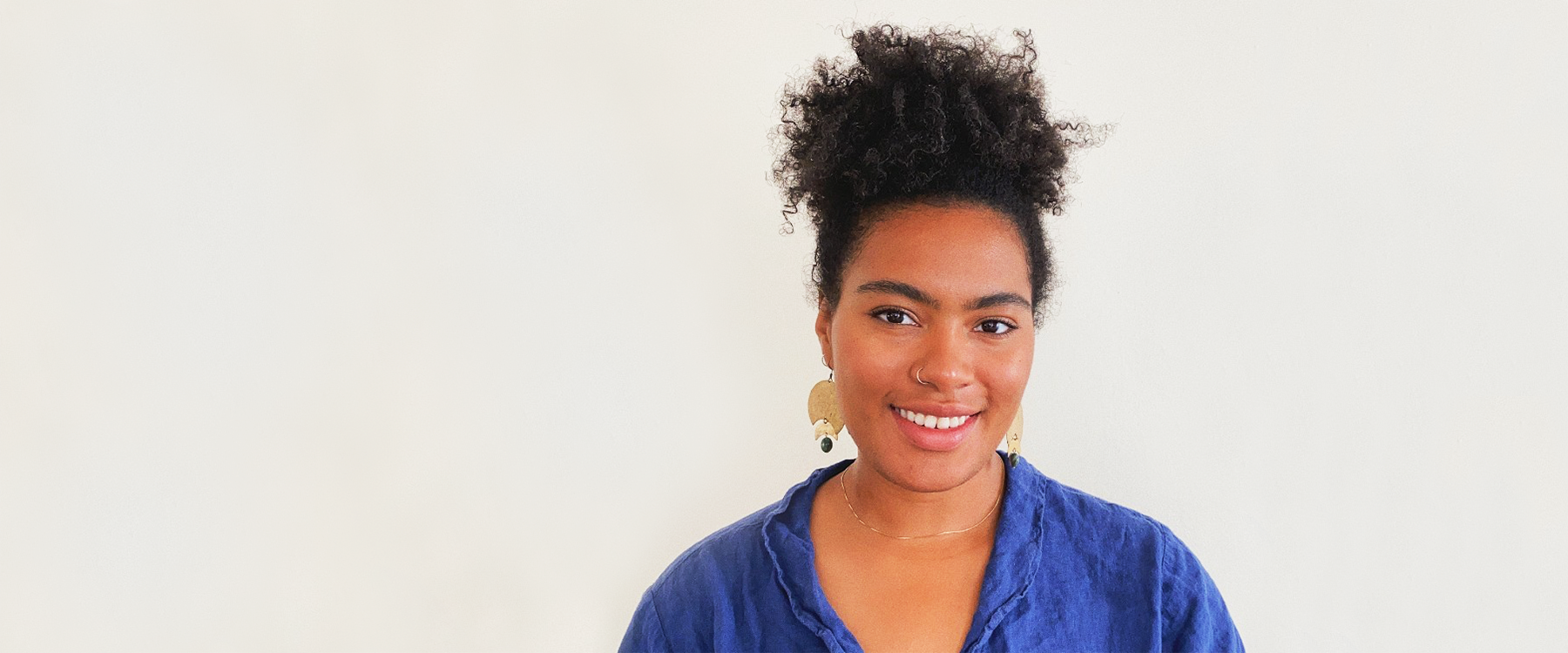Tyler Hulick, B.S.N., ’20, and Kelly Soto, B.S.N., ’20, were each immersed in their senior year practicum rotations at the OHSU School of Nursing when the COVID-19 pandemic began spreading across the U.S. They were pulled from their in-person, hands-on clinical rotations and required to complete their practicum online, the first test of the resiliency they would need as nurses during the pandemic.
After graduating from the OHSU School of Nursing La Grande Campus, Hulick began working at in the cardiac care unit at St. Luke’s Meridian Medical Center in Idaho. He felt well-prepared for in-hospital nursing, having spent many clinical hours at St. Luke’s before completing his practicum remotely.
“I hit the ground running,” Hulick says. But the situation was difficult. “Things were going pretty bad. And we were just trying to do the best we could.”

Soto, who graduated from the OHSU School of Nursing Monmouth Campus, completed only half of her practicum in the pediatric oncology unit at OHSU Doernbecher Children’s Hospital in person. To extend her hands-on training after graduating, Soto opted to complete a nursing residency at PeaceHealth Sacred Heart Medical Center at Riverbend in Springfield, Oregon, where she worked in labor and delivery and adult orthopedics.
“Knowing that you jumped in when things were the worst they’ve been in your lifetime, you know you can handle anything else that happens.”
Kelly Soto
During her residency, Soto saw many nurses quit.
“Some had always wanted to be a nurse,” she said. “And then when it came to the pandemic, they said, ‘This is too much.’” Nurses felt overworked with no time for self-care. High patient ratios and understaffing became common.
“I’m the kind of person that has a hard time saying, ‘No,’ when people need you. When you’re working your fourth shift in a row, you’re mentally and physically exhausted, but you want to help out your unit.”
Soto learned to use the few resources she had.
“It does teach you a lot about resilience,” she said. “It teaches you about being creative and to lean on your clinical support staff.”
During her time in labor and delivery, Soto faced some of the most emotionally challenging work of her career. As she witnessed fetal deaths, she leaned into compassion, hugging patients as they cried on her shoulder.
“You never forget the cry of a mom who just lost her baby,” Soto said.
In the cardiac care unit, Hulick was overwhelmed by the many times he had to tell his patients’ families that they were not progressing well and needed to move to the ICU for intubation. He has painful memories of watching his patients’ health deteriorate and telling their families what to expect as their loved ones were dying.
“I never expected to see or experience death in the health care field as soon as I did,” Hulick says. “Seeing so much (death) at once — unfortunately, it became what was normal.”
One of Hulick’s most positive experiences at St. Luke’s was the opportunity to precept newly hired nursing graduates. He discovered his passion for mentoring and feels he was able to successfully help recent nursing graduates understand how to navigate COVID-19.
“The struggles of COVID didn’t break me. I feel it has made me a stronger person.”
Tyler Hulick

Over the past year, Hulick and his fiancée, Mikayla Mormance, B.S.N. ’19, have been working together as travelling nurses. They enjoy seeing new places and dealing with new populations. Hulick grew up in rural Eastern Oregon and appreciates the chance to work in Denver, Seattle and now, Portland.
“It really has opened up my world,” he said.
Currently, Soto holds a full-time position in the pediatric orthopedics in-patient unit at Shriners Children’s Hospital in Portland while attending school full-time; she plans to graduate with her D.N.P. from the OHSU School of Nursing in June 2024.
Soto’s experience as a multi-ethnic Latina nurse heightens her concern that people of color are often treated as “less than” in the U.S. health care system. She has observed that positions of power in health care systems are predominantly held by white men. She advocates for more inclusive hires at Shriners and has encouraged Latina/o/x students to consider careers in nursing.
“I’m doing whatever I can to promote diversity so that everybody’s voice matters” Soto said. “I wish I could do more now as an RN, but I think that my voice would definitely be stronger once I have that doctorate.”
Hulick and Soto feel it is essential for nurses to have someone they can turn to for support when they feel overwhelmed. Hulick often leans on his fiancée, learning from her patience and advice. Soto is a caregiver for her grandmother, from whom she receives emotional support and encouragement.
“She is that cheerleader who keeps me going,” Soto said.
Hulick credits his nursing instructor in La Grande, Katrina Dielman, M.S., RN, with reminding him to step away and care for himself when his job becomes overwhelming. His self-care includes visits to the gym, spending time outdoors hunting and fishing, hiking with Mormance and caring for his cat.
Soto describes herself as a faith-based nurse, relying on her faith for her resilience.
“You’re dealing with situations that you can’t always control. It helps to bring that to a higher power. That’s where I get a lot of the strength to continue doing what I do,” she said, adding that she also prioritizes family time with her grandmother, brother and niece.
When reflecting on her experience during the pandemic, Soto has no regrets.
“I felt honored to enter the nursing profession at that time. I wanted to help,” she said. “Knowing that you jumped in when things were the worst they’ve been in your lifetime, you know you can handle anything else that happens.”
“The struggles of COVID didn’t break me,” Hulick said. “I feel it has made me a stronger person. I found I have a calling to help people, and what better way to answer that then by continuing a career in nursing.”




